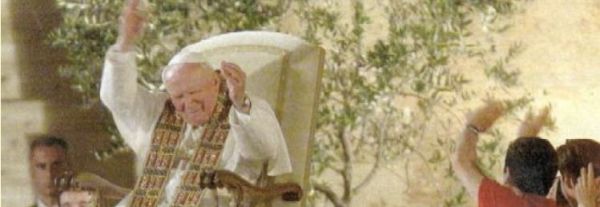2. In this moment of your life, the Pope is happy to be with you in order to listen respectfully to your anxieties and cares, your expectations and hopes. He is here among you to share with you the certainty which is Christ, the truth which is Christ, the love which is Christ. The Church looks to you with the greatest care, because she sees in you her own future and she puts her hope in you.
I imagine that you may be wondering what the Pope wants to say to you this evening before departing. It is this: I want to entrust to you two messages, two "words" spoken by Jesus who is the Word of the Father, and I hope that you will guard them as a treasure for the rest of your life (cf. Mt 6:21).
The first word is that "Come and see", spoken by Jesus to the two disciples who had asked him where he lived (cf. Jn 1:38-39). It is an invitation which has sustained and inspired the Church on her journey through the centuries. I repeat it to you today, dear friends. Draw near to Jesus and strive to "see" what he is able to offer you. Do not be afraid to cross the threshold of his dwelling, to speak with him face to face, as friends speak to each other (cf. Ex 33:11). Do not be afraid of the "new life" which he offers. In your parishes, in your groups and movements, place yourselves at the feet of the Master in order to make your life a response to the "vocation" which, in his love, he has always had in mind for you.
True, Jesus is a demanding friend who sets high goals and asks us to go out of ourselves in order to come to meet him: "Whoever loses his life for my sake and the Gospel’s will save it" (Mk 8:35). This statement can seem difficult, and in some cases can even be frightening. But I ask you: is it better to resign yourself to a life without ideals, to a society marked by inequality, oppression and selfishness, or rather to seek with a generous heart what is true, good and just, working to build a world which shows forth the beauty of God, even at the price of having to face the many difficulties which this brings?
3. Knock down the barriers of superficiality and fear! Talk to Jesus in prayer and listen to his word. Taste the joy of reconciliation in the Sacrament of Penance. Receive his Body and Blood in the Eucharist, so that you can then welcome him and serve him in your brothers and sisters. Do not yield to the deceits and easy illusions of the world, which very often turn into tragic delusions.
You know that it is at difficult moments and trying times that the quality of our choices is measured. There are no short cuts to happiness and light! Only Jesus can supply answers which are neither illusion nor delusion!
With a sense of duty and sacrifice, therefore, take the path of conversion, of inner growth, of professional commitment, of voluntary work, of dialogue, of respect for all, never surrendering in the face of difficulties or failures, in the full knowledge that your strength is in the Lord, who guides your steps with love (cf. Neh 8:10).
[Pope John Paul II, Plovdiv Cathedral speech, Sunday, 26 May 2002].
Aspiration for Peace: Associated with His Life
16. Dear brothers and sisters in Christ, the aspiration to peace that you share with all people corresponds to God's initial call to form one family of brothers and sisters, created in the image of the same Father. Revelation insists on our freedom and solidarity. The difficulties we encounter on the path to peace, are partly related to our weakness as creatures, whose steps are necessarily slow and gradual; they are aggravated by our selfishness, by our sins of all kinds, after that sin of origin, which marked a break with God, leading to a break also between brothers. The image of the Tower of Babel describes the situation well. But we believe that Jesus Christ, by the gift of his life on the cross, has become our Peace: he has broken down the wall of hatred, which separated our brother enemies (cf. Eph 2:14). Resurrected and entered into the glory of the Father, he mysteriously associates us with his Life: by reconciling us with God, he mends the wounds of sin and division and makes us capable of inscribing in our societies a sketch of that unity which he restores in us. Christ's most faithful disciples have been peacemakers, even to the point of forgiving their enemies, even to the point of sometimes offering their own lives for them. Their example traces the way for a new humanity, which is no longer content with temporary compromises, but realises the deepest fraternity. We know that our path to peace on earth, without losing its natural consistency or its own difficulties, is embedded within another path, that of "salvation", which finds fulfilment in an eternal fullness of peace, in total communion with God. And so the Kingdom of God, which is the Kingdom of peace, with its own source, means and end, already permeates all earthly activity without dissolving into it. This vision of faith has a profound impact on the daily actions of Christians.
[Pope John Paul II, Message for the 12th World Day of Peace, 1 January 1979]












